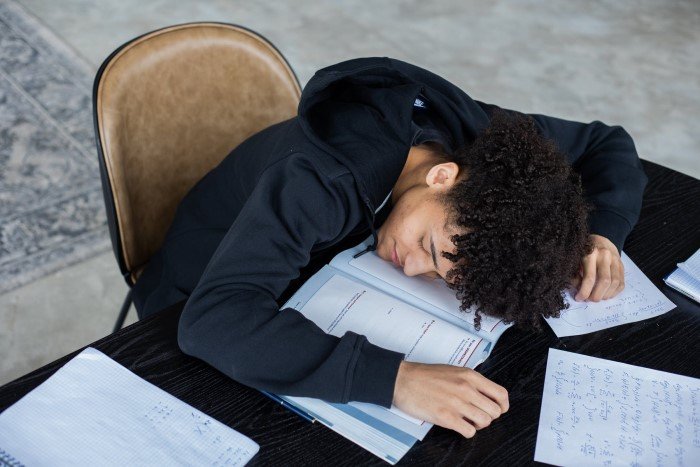Is it Better to Sleep or Study?
Are you ready to take your academic journey to the next level? We've got just the thing for you: UPchieve, your ultimate homework help companion! Sign up today for free!
Introduction
Daylight savings time begins next week on March 13, 2022. We’ll say goodbye to dark winter days …. and one precious, precious hour of sleep. And if you’re not sure if you should sleep in an hour later to recover your lost sleep–or if you should go ahead and suffer through the day–you might be wondering: is it better to sleep or study?
Now, losing an hour of sleep might not seem like a big deal to our current generation, as we’re always on the go anyways. Between classes, homework, college prep, family responsibilities, part-time jobs, sports, and me-time … what is an hour when you feel like you barely sleep as it is? At the same time, deciding if, where, and how to study when exhausted is an on-going struggle. Students can feel anxious or even guilty to let themselves rest.
So, is it better to stay up and study or sleep? It turns out that a solid night of sleep is actually the best (and most underrated) study tip to learn and memorize anything. This is the first of a multi-part series on memory where we explain the top, research-backed tips for memorizing anything.
Why is sleep important for students?
Still not convinced that sleep should be an important focus of your self-care regimen? Read on to learn how sleep can help you tackle homework with ease:
1. Sleep is the ultimate brain-hack
Scientific research has long shown that sleep plays a critical role in learning and memory. In order to understand how and why sleep helps us learn, let’s first look at how our brains process information and remember things.
Memory is like a Lego set.
2. Memory is like a Lego set
Recalling information involves assembling the right pieces
Memories are not like video files, stored in whole reels in your brain to replay or keep saved when they aren’t needed. A better analogy for memory is a Lego set. Your experiences are broken into countless little bits of information that are stuffed all over your brain. Imagine a whole box of Legos dumped out on the table. You also have some pieces rolling under the couch, the base up on the shelf, and the instructions in a totally different room.
When you recall something, your brain is actually working to reassemble the parts of your experience into a clearer memory. It is as though you are rushing around to gather up the different Lego pieces in order to rebuild the set.
Of course, sometimes you just cannot remember how to put the pieces together. Sometimes you cannot find some essential part. And sometimes you end up swapping out so many replacement parts that the result looks completely different from the original.
This is why remembering is a difficult and imperfect process.
Sleep “organizes” your brain so that you can remember things more easily and quickly.
Enter the Lego-organizing crew: Sleep
In this analogy, the Lego set would be anything you need to remember: the parts of a cell for Biology class, a list of Spanish vocabulary words, how to solve a quadratic equation, your new ZOOM schedule, and so on. The Lego builder is your brain, running around to collect all of the right pieces and rebuild the set.
Then comes an organizing crew: SLEEP.
During sleep, your brain builds pathways that connect and consolidate the information you took in during the day. This would be like the organizing crew reviewing the Lego set instructions and sorting the parts you need by step, color, and size.
Your brain is also clearing out old unnecessary data to make space for your new memories. Or, in Lego-speak, you are putting away random pieces that you don’t need and throwing away broken ones.
These steps help your brain rebuild that Lego set — or retrieve that memory — more quickly and accurately the next day.
Your brain continues to learn while you sleep.
3. Sleeping IS cramming
There is one more trick that your Lego organizing crew does while you sleep: it practices.
Researchers theorize that sleeping is a time that the brain rehearses new information. In a 2014 study, scientists at NYU watched how sleep impacts learning using genetically engineered mice who were taught how to keep their balance on a spinning rod. These mice had fluorescent protein in their neurons - literally glowing brains - so that the scientists could track any changes in their brain structure that showed learning.
One group of mice went right to sleep (for seven hours) after this lesson. In the area of the brain associated with movement, the scientists saw extensive growth of “postsynaptic dendritic spines” - basically, spiky bridges that connect brain cells together to share information.
What surprised them was that the brain cells continued to grow and were reactivated while the mice slept, as though they were continually practicing balancing on that rod.
In other words, the brain continues to learn and consolidate information during sleep. If you can’t decide whether or not to sleep or cram, sleeping is already a version of all-night cramming.
Studies show that well-rested students do better on exams.
4. Well-rested students do better on tests
Sleep deprivation hurts learning and performance
Another group of mice trained for the same amount of time but stayed awake for those seven hours. Those sleep-deprived mice had fewer sprouting connections which showed that they learned less. When the mice were retested, the well-rested mice did twice as better than the tired mice. Even when the tired mice were able to “catch up” on sleep on a different day, they still could not form the same amount of brain connections for this skill as the first group did on their first try. These mice were also less likely to hold onto the new connections they did make.
These types of experiments have counterparts with actual students. Scores of studies conclude that students really do better when they sleep. Sleeping poorly (or not at all) leads to worse test results and poorer ability to learn new things. In fact, an all nighter hurts your ability to think, reason, and understand to the same degree as if you were taking your test drunk. In fact, sleep is so central to learning that Harvard began requiring incoming freshman to complete an online training on sleeping habits called Sleep 101. Sleep should be considered a foundational part of your study plan.
Final Thoughts
Prioritizing sleep can be a great step to take in order to improve you study habits, just like finding your learning style or figuring out how to beat procrastination.
If you feel like you’re losing sleep over your homework, try finding an online tutor that can help you master new topics on your own time. get free online homework help through UPchieve. UPchieve is a nonprofit that connects Title 1 High School students to free online tutors 24/7. Check to see if your school qualifies.





